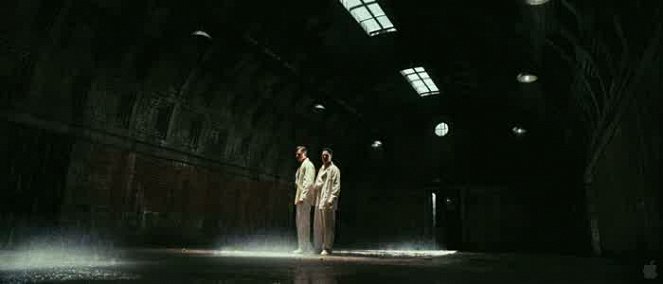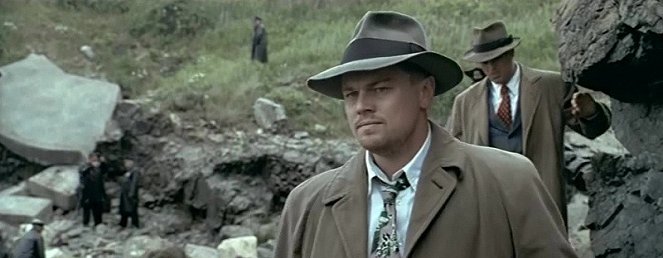Réalisation:
Martin ScorseseScénario:
Laeta KalogridisPhotographie:
Robert RichardsonActeurs·trices:
Leonardo DiCaprio, Mark Ruffalo, Ben Kingsley, Max von Sydow, Michelle Williams, Emily Mortimer, Patricia Clarkson, Jackie Earle Haley (plus)VOD (4)
Résumés(1)
En 1954, le marshal Teddy Daniels et son coéquipier Chuck Aule sont envoyés enquêter sur l'île de Shutter Island, dans un hôpital psychiatrique où sont internés de dangereux criminels. L'une des patientes, Rachel Solando, a inexplicablement disparu. Comment la meurtrière a-t-elle pu sortir d'une cellule fermée de l'extérieur ? Le seul indice retrouvé dans la pièce est une feuille de papier sur laquelle on peut lire une suite de chiffres et de lettres sans signification apparente. Oeuvre cohérente d'une malade, ou cryptogramme ? (Paramount Pictures FR)
(plus)Vidéo (3)
Critiques (16)
"Shutter Island" est un peu comme une sélection de films de De Palma - il ne convient pas à tout le monde, mais ceux qu'il attrape, il les abat. Cela a commencé par un voyage et l'arrivée sur une île mystérieuse, qui, en termes de caméra, de montage et d'utilisation d'une musique rétro effrayante dans le style de Miklós Rózsa, représente également un manuel d'étude précieux pour créer une ouverture de film absolument captivante, comme le débarquement initial dans "Il faut sauver le soldat Ryan". Et cela s'est terminé non pas tant par un retournement de situation qui a inversé l'intrigue précédente (ce scénario, d'ailleurs, n'est pas si original dans le monde du cinéma), mais par son ajout - la dernière scène et la dernière réplique du film, qui a propulsé "ce thriller avec DiCaprio, qui attire les foules" trois étages plus haut. On peut reprocher à tout ce qui se trouve entre l'introduction et la conclusion une touche parfois kitsch, une orientation exagérément désorientée entre réalité et hallucinations (ce qui soulève quelques questions troublantes), ou une approche froide des personnages. Mais tout cela fait partie du jeu rusé du réalisateur, qui ne vise pas les frissons des maniaques dans les cellules du bloc C, ni l'émotion sentimentale face au destin du personnage principal. Parce que ce réalisateur joue avec une tout autre corde sensible. +++ Après avoir visionné pour la deuxième fois, mes mains tremblaient comme après avoir fumé un paquet de cigarettes du Dr Cawley. Un film exceptionnel d'une autre dimension métasensorielle.
()
The last time I felt this much enthusiasm from perfect filmmaking in a new film was with Inglorious Basterds. From the moment they arrive on the island, it was clear that this would be an exceptional film, tailor-made for me – sometimes you just know it from the very first scene. Scorsese builds the atmosphere masterfully (shots on details, striking music, visual tricks of various crap flying around), I couldn’t find a single weak spot; Shutter Island is 130 minutes of concentrated depression, mystery and madness. Regarding the complaints of certain viewers about the lack of originality, or rather, the predictable twist, it’s worth mentioning that what they believe is a twist, it’s not so, it’s just the resolution to a classic misleading plot (in that sense, the film can only have two outcomes, and you don’t have to be a genius to “figure out” the right one) that only serves to lay down the ground for the real twist, which is very inconspicuous, original, and clever. Putting all this together, Shutter Island is for me more interesting than all of Marty’s famous gangster films.
()
The key questions are: does Shutter Island offer anything more than a well-built but remarkably unbalanced genre story? Isn't the feeling of confusion that comes after watching it actually just a reflection of the inner emptiness of the story that was told? Does the shocking point not only explain, but also justify all the wonders (logical, spatiotemporal and ideological) of the previous events? I can’t say that I’m closer to the answer YES... Which is quite a sad outcome for M. Scorsese's film. Despite the absorbing atmosphere, despite DiCaprio, despite some really great moments, I'm far from appreciating the creative game, however much I am able to accept it. I shake my head helplessly over a work that is a much more effective trick than a thoughtful manipulation. Perhaps if the film stayed away from stray attempts to overlap and admitted without torture that it was ONLY a pure, and at its core a blunt genre film, I would have left the movie theatre more satisfied.
()
For perhaps the first time ever, Martin Scorsese doesn't tell a story but rather glues together scenes that are more like visual masturbation by him and the cinematographer. The actors (DiCaprio is traditionally great, and so is Mark Ruffalo, despite being unnecessarily kept in the back,) do their best and deliver fine dialogues, but the plot doesn't go anywhere, the film lacks any tension, and the characters drown in having to run around the island confused and in the cheap memories of Dachau. Also, waiting almost two hours for the point seems pretty damn cheap for a director who was originally supposed to sell it as the polished thriller of the year. With all due respect to the master, this is a bad and tediously boring film through and through.
()
“I’ve seen something like it before.” I’m going to throw out some spoilers, so it would be better if you read this after seeing the film. On the first viewing, until the lengthy explanatory passage, Shutter Island is a paranoid crime thriller that draws on Hitchcock’s legacy and horror B-movies. On the second viewing, it is an atmospheric drama laden with the questions that Scorsese has posed throughout his entire filmography (What’s worse, emotional or physical violence? Is it better to stay in one’s accepted role or to reveal one’s true face? To accept guilt or let it consume you?). Unfortunately, the second viewing reveals not only the well-thought-out distribution of clues leading us to the final revelation, but also the film’s inability to work on both levels simultaneously. The pleasure of a skilfully shot, though not entirely smoothly flowing genre movie (the shots don't fit together as elegantly as in Casino, for example) is disrupted by long dialogue scenes in which the Big Issue is addressed, which Scorsese is again unable to properly elaborate on, because he would deprive himself and us of the pleasure taken from the presence of trashy add-ons like Nazis, mass murder, a mysterious lighthouse and a lobotomy. In short, he spoils the fun by trying to squeeze something more out of it, which is manifested in the significant reduction of the funny verbal exchanges between Chuck and Teddy from the book on which the film is based (and which, incidentally, can be read in one breath both as a genre treat and as a suspenseful story that may conceal something more). Therefore, I find it more inspiring to watch Shutter Island, even at the cost of a slight overinterpretation, as a multi-level psychoanalytical treat for all followers of Žižek (Teddy constantly moves between different floors, which we can see as “levels” of his mind; familiar with Teddy’s dreams, Dr. Cawley personifies the subconscious; Chuck, addressing Teddy as “boss”, conversely represents his – seemingly – controlled ego) which with its narrative is – probably unintentionally – reminiscent of a video game (restarting the mission, collecting objects and solving riddles, Teddy as Laeddis’s game avatar…). Choose what makes more sense to you. Regardless of its faults, one visit to Shutter Island will almost definitely not be enough. 85%
()



Annonces